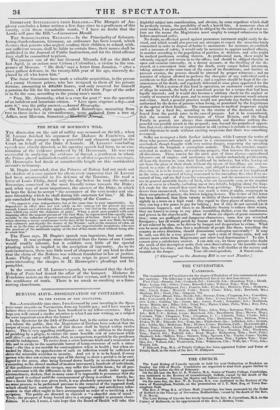THE DUKE OF BOURBON'S WILL.
THE discussion on the suit of nullity was resumed on the 6th ; when M. Lavaux finished his argument for Madame de Peucheetis, and M. Dupin the younger made a powerful and eloquent appeal to the Court on behalf of the Duke d'Aumale. m. Lavaux's concluding speech was chiefly directed, as his opening speech had been, to an exa- mination of the evidence produeed by M. Hennequin. He was very successful in analysing the evidence of Surval, a gentleman in whom the Prince placed unlimited confidence in all that respected his carriag es. 31. Hennequin had dwelt at considerable length on this confidential servant's testimony.
31. Dupin contended, that the Princes of Roban had not made out the shadow of a case against his client, even supposing that M. Lavaux bad been unsuccessful itt his defence of the Bayonne. He read a letter of Louis Philip, dated only the day before be took the oaths as Sovereign, conceived in the most friendly terms towards the Duke ; and, what was of more importance, the answer of the Duke, in which he begs the King to accept "the assurance of the very tender and sin- cere friendship which he shall during life entertain for him." 31. Du- pin concluded by invoking the impartiality of the Court-
" We appeal to your independence, but at the same time to your impartiality. In- depeudeuee in effect does not rest solely on the courage (at the present day easy enough, I must say) of braving what is called power ; but also in the energy, still more rare, which eon resist the clamours of party. W hen a great poet painted with such imposing effect the majestic picture of ' the Just Man,' he represented him equally inac- cessible to the influence of power and the malignity of faction. Such was L'Ilitpital, when showing a serene countenance tone fury of the League; such was Mole, braving with calmness and dignity the storms of the Fronde; such in the moment of calm, as well as in the tine of agitation and trouble, is the imperturbable magistrate, who sees the passions of the multitude raging at the foot of his curule chair without being able to reach him."
The Times says, M. Dupin's speech was ingenious, but not satis- factory. It was perhaps more rhetorical than the forms of our Courts would readily tolerate, but it exhibits very little of the special pleading which is implied in the ascription of ingenuity. As to its satisfactoriness, there was little need of eloquence of any kind to show that the claim of the Rohans was without foundation in law or justice. Louis Philip may still live, and even reign in peace and honour, notwithstanding the charges in M. Hennequin's pleadings and his pamphlet.
In the course of M. Lavaux's speech, he mentioned that the Arch- bishop of Paris had denied the affitir of the bouquet. Madame de Feteheres insists on the correctness of her version, and it certainly has the semblance of truth. There is no sneak so sneaking as a time-
serving churchman.


























 Previous page
Previous page